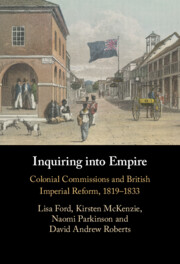1 - Introduction
Published online by Cambridge University Press: 18 March 2025
Summary
This introduction sets up our core findings about imperial inquiry and the British world in the second quarter of the nineteenth century. It places imperial inquiry in the overlapping contexts of transforming modes of governmentality in Britain and changing ideas and practices of colonialism in the Age of Revolution. We outline the limitations of previous scholarly understandings both of this period and of the imperial commissions themselves. We also introduce the notion of ‘constructive conservatism’ as an entry point to understanding the vexed relationship between reform and reaction that characterised not only the Liverpool Administration (1812 – 1827) but also the wider context of Britain’s imperial meridian that would usher in a new phase of global history.
Keywords
Information
- Type
- Chapter
- Information
- Inquiring into EmpireColonial Commissions and British Imperial Reform, 1819–1833, pp. 1 - 30Publisher: Cambridge University PressPrint publication year: 2025
